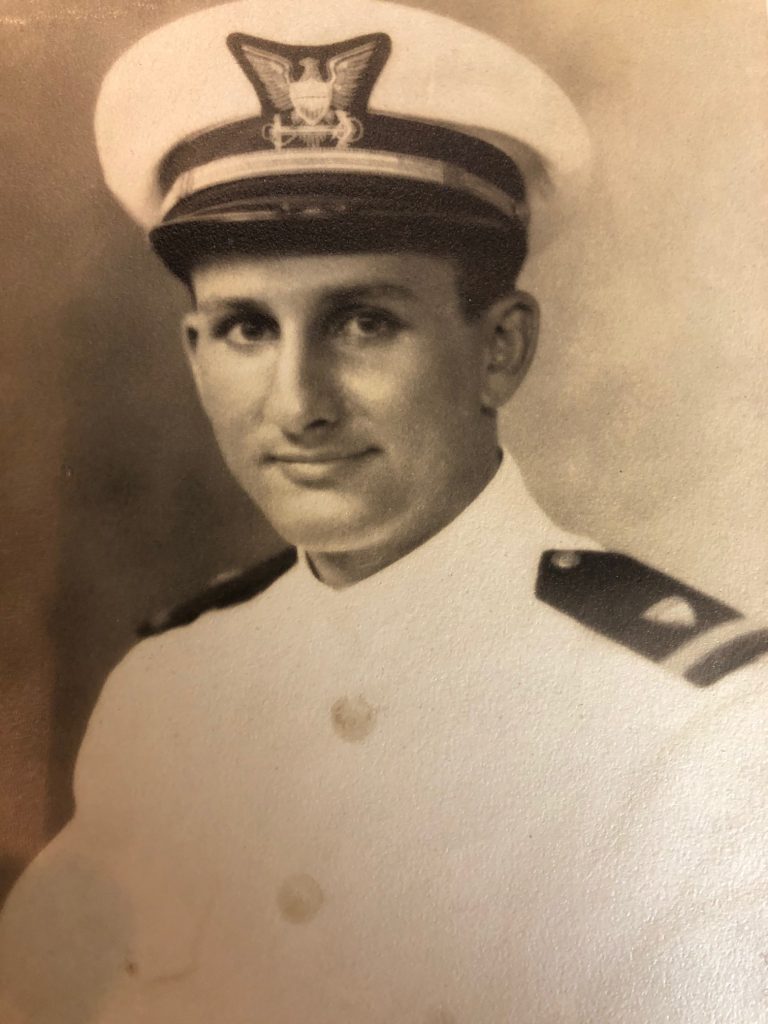By Charles J. Lockwood, MD
Senior Vice President for USF Health
Dean of the Morsani College of Medicine
As we mark the 75th anniversary of the end of the Second World War, I can’t help but think that there are fewer and fewer of the greatest generation with us to celebrate their remarkable achievement. My father was one of those young men who selflessly contributed to our victory. He grew up on the shores of Lake Erie, the son of a Great Lakes’ merchant marine captain. He spent summers working on his father’s ships. When my grandfather moved to Miami to take a job as a “banana boat” freighter captain, my father finished high school at Miami Edison where he played basketball despite being only 5’ 6”. He spent the next year as a helmsman on a Steinbrenner car carrier – the Phillip Minch on the Great Lakes. His description of a particularly fierce November gale on Lake Superior still sends shivers down my spine. A forward hatch had given way and the ship was taking on water and he had to crawl on the pitching deck with another sailor to secure it. He described being hit broadside by a giant wave that knocked the wind out of him and almost washed him overboard. He somehow held on, revived, secured the hatch with the help of the older sailor, and made it back to the bridge.

Charles William Lockwood
The following fall he enrolled at the University of Miami. On December 8th, 1941 he tried to enlist in the Navy but was rejected because he was underweight. Not deterred, he shamelessly used his father’s “pull” to get a commission in the Coast Guard. Based on his college time and experience on large ships coupled with the Nation’s desperate need for seagoing officers, he was commissioned an ensign in the Coast Guard and was immediately sent to sea on the Spruce, a converted buoy tender that soon served as a convoy escort vessel in the Atlantic and, later the Caribbean. The ship’s Captain, Mr. Larsen, and her Executive officer, Mr. Conrad, were old merchant marine hands and friends of my grandfather and they patiently mentored my father, perfecting his celestial navigation and ship handling skills and teaching him proper naval etiquette. My father recalled one night when two German torpedoes raced just a head of his ship as he took evasive action. He called the Captain to the bridge who calmly called in the contact and winked at my father telling him they were probably just really fast “dolphins”.
After gaining experience my father was given command of a Coast Guard subchaser and attacked a U-boat off the coast of South America with depth charges. The attack produced an oil slick, was listed as a possible “kill” and resulted in a promotion and transfer to the Coast Guard Academy’s underwater warfare school. Following this training he was reassigned to the USS Campbell, a large cutter that was the flagship of the Coast Guard in WWII. When he reached Pearl Harbor after a long flight, he went to the US Navy Officer’s Club and saw a table labeled “Charles Lockwood.” He was duly impressed that his arrival had been noticed and sat down. Within seconds two burly shore patrol sailors hoisted him out of his seat and told him that the table was reserved for “the other Charles Lockwood,” a Vice Admiral and commander of the Pacific Fleet Submarine Force (COMSUBPAC)!
When I asked him if he was ever frightened during the war – he said just once. Following the battle of Okinawa, the island was hit by a horrific typhon requiring the entire invasion fleet to go to sea. He was the officer of the deck at the height of the storm which had 150 knot winds generating 100-foot waves, He watched as several large ships foundered unable to offer aid. When his long watch was over, he headed to the officers’ mess, strapped himself in a chair and ate a vat of ice cream.
My dad stayed on in Japan as part of the occupation forces through 1946. He then returned to Florida, married my mother, and was reassigned to finish his schooling under the GI bill at the University of Florida, graduating with honors in Engineering. He did well enough to be offered a job at Stone & Webster, a white shoe engineering firm in Boston, where he helped design hydroelectric plants on the Columbia River in Washington state. In an era when the term “hero” is often assigned for just showing up to work, my father and countless others of his greatest generation actually earned the title. Thanks Dad.
